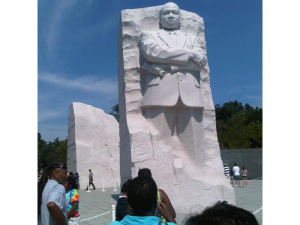“Let us keep the issues where they are. The issue is injustice. The issue is the refusal of Memphis to be fair and honest in its dealings with its public servants, who happen to be sanitation workers. Now, we’ve got to keep attention on that.”
Martin Luther King, Jr, “I’ve Been to the Mountaintop,” delivered 3 April 1968, Mason Temple (Church of God in Christ Headquarters), Memphis, Tennessee (the night before his death)
—–
Dr. Martin Luther King, Jr. — 48 years ago today.

I was 12 years old, and not paying much attention. And a lot of others were not paying much attention either, though they were old enough that they should have known better.
But on this day, August 28, 1963, he did what he did best. He spoke the words of his mind and his heart. And, if you look at his career, that’s what he did: he spoke. He spoke, and spoke, and marched, and spoke, and stood with others, and got arrested, and wrote a brilliant letter from a jail cell, and spoke some more, right up to the night before he died.
The big event, at which he gave his greatest speech (many call it the greatest speech of the 20th century in this country), was named the “March on Washington for Jobs and Freedom.” His dream had been shared at least one time earlier, in Detroit (in the audience was the Pastor who helped organize the event, Reverend Franklin, and the Pastor’s young adult daughter, Aretha):
This earlier version included these words:
“I have a dream this afternoon that one day right here in Detroit, Negroes will be able to buy a house or rent a house anywhere that their money will carry them and they will be able to get a job…” (emphasis added)
(Read about the Detroit version here).
On this day in August of 1963, his themes sounded forth in a loud and clear voice.
What did he accomplish? Some, so much…not enough. He spent the rest of his years adding to the “simple” civil rights struggle with ongoing, deep, and abiding concern for jobs, and then, at the end, opposition to the war in Vietnam.
I think it may be best to call him simply the Prophet. “The lion has roared–who will not fear? The Sovereign LORD has spoken–who can but prophesy?” wrote Amos (Amos 3:8). And so, when Dr. King saw injustice, he spoke. Over and over and over again.
Does speaking matter? Does speaking up, speaking out, matter? Yes – it may be the one thing that matters most. The history of getting things accomplished always begins with: “In the beginning was the word.” Take your pick – Winston Churchill spoke, and they did fight them on the beaches, and never did surrender… Franklin Roosevelt spoke, and people learned that fear itself was the greatest thing to fear. JFK spoke about a bold idea to accomplish by the end of the decade, and we did send men to the moon and bring them safely back to earth again.
Words lead to deeds. They always have. They always will.
Sadly, Dr. King was silenced far too soon. What would he be doing today? I suspect he would speak, with his loud and clear voice, about jobs. Remember, it was the “March on Washington for Jobs and Freedom.” And on the night before he died, he spoke in Memphis, speaking out for the jobs of sanitation workers who were not treated justly. Injustice, injustice in the arena of jobs — jobs for the common person. This mattered to Dr. King. And when something mattered to Dr. King, he always knew what to do — he spoke.

He spent the last night of his life at the Lorraine Motel, room 306. I show a brief video, which includes his I Have a Dream Speech, to each of my speech classes. It is narrated by Peter Jennings. There is the iconic photo of Dr. King on the balcony of the Lorraine Motel, standing next to a very young Jesse Jackson. I’ve been to the Lorraine Motel. It is as Peter Jennings described it: “a cheap, cinder block rooming house.” He did not go to Memphis looking for a plush retreat. He stayed in a modest place, and spoke to and about the workers. He cared about them, and their jobs. And he spoke. It is what he always did.
It would be nice to hear that voice today. No adequate replacement has arisen. That is why his words are etched in granite in the new memorial, just a stones throw from where he spoke some 48 years ago.
——
Update: my wife just read this post, and reminded me that Dr. King may not have been (probably was not!) welcome at the nicer hotels of Memphis in the 1960s. The Lorraine Motel may have been the kind of option he faced. I should have remembered this. (“We can never be satisfied as long as our bodies, heavy with the fatigue of travel, cannot gain lodging in the motels of the highways and the hotels of the cities.” – I Have A Dream. & “When you take a cross county drive and find it necessary to sleep night after night in the uncomfortable corners of your automobile because no motel will accept you” – Letter from Birmingham Jail).

I watched that same Peter Jennings documentary years ago. I have been searching for it and would appreciate if you could provide me with the title or link. Thank you!
I apologize. I do not know the exact name. It was an old VHS tape that had the entire I Have a Dream speech, with a few minutes of Peter Jennings’ narration before the speech and at the end, including moments after the death, and before the funeral, for Dr. King. The VHS tape was sadly lost at some point.